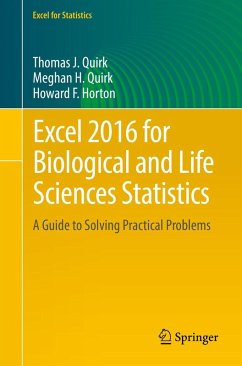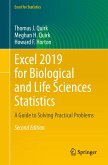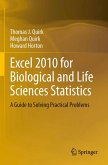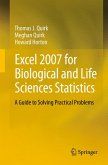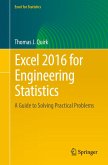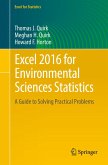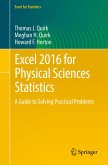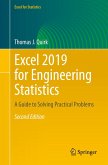This book is a step-by-step exercise-driven guide for students and practitioners who need to master Excel to solve practical biological and life science problems. If understanding statistics isn't your strongest suit, you are not especially mathematically-inclined, or if you are wary of computers, this is the right book for you.
Excel is an effective learning tool for quantitative analyses in biological and life sciences courses. Its powerful computational ability and graphical functions make learning statistics much easier than in years past. However, Excel 2016 for Biological and Life Sciences Statistics: A Guide to Solving Practical Problems is the first book to capitalize on these improvements by teaching students and managers how to apply Excel 2016 to statistical techniques necessary in their courses and work.
Each chapter explains statistical formulas and directs the reader to use Excel commands to solve specific, easy-to-understand biological and life science problems. Practice problems are provided at the end of each chapter with their solutions in an appendix. Separately, there is a full Practice Test (with answers in an Appendix) that allows readers to test what they have learned.
Prof. Tom Quirk spent six years in educational research at The American Institutes for Research and Educational Testing Service. He is Professor of Marketing in the Walker School of Business & Technology at Webster University in St. Louis, Missouri (USA). He holds a B.S. in Mathematics from John Carroll University, both an M.A. in Education and a Ph.D. in Educational Psychology from Stanford University, and an MBA from The University of Missouri-St. Louis.
Dr. Meghan Quirk holds a Ph.D. in Biological Education and an M.A. in Biological Sciences from the University of Northern Colorado (UNC) and a B.A. in Biology and Religion at Principia College in Elsah, Illinois. She has co-authored an article on shortgrass steppe ecosystems in Photochemistry & Photobiology. She was a National Science Foundation Fellow GK-12, and currently teaches science in Bailey, Colorado.
Howard F. Horton holds an MS in Biological Sciences from the University of Northern Colorado (UNC) and a BS in Biological Sciences from Mesa State College. He has worked on research projects in Pawnee National Grasslands and Long-Term Ecological Research at Toolik Lake, Alaska. He has co-authored articles in The International Journal of Speleology and The Journal of Cave and Karst Studies. He was a National Science Foundation Fellow GK-12. He is currently the Angler Outreach Coordinator with Colorado Parks and Wildlife.
Excel is an effective learning tool for quantitative analyses in biological and life sciences courses. Its powerful computational ability and graphical functions make learning statistics much easier than in years past. However, Excel 2016 for Biological and Life Sciences Statistics: A Guide to Solving Practical Problems is the first book to capitalize on these improvements by teaching students and managers how to apply Excel 2016 to statistical techniques necessary in their courses and work.
Each chapter explains statistical formulas and directs the reader to use Excel commands to solve specific, easy-to-understand biological and life science problems. Practice problems are provided at the end of each chapter with their solutions in an appendix. Separately, there is a full Practice Test (with answers in an Appendix) that allows readers to test what they have learned.
- Includes 164 illustrations in color
- Suitable for undergraduates or graduate students
Prof. Tom Quirk spent six years in educational research at The American Institutes for Research and Educational Testing Service. He is Professor of Marketing in the Walker School of Business & Technology at Webster University in St. Louis, Missouri (USA). He holds a B.S. in Mathematics from John Carroll University, both an M.A. in Education and a Ph.D. in Educational Psychology from Stanford University, and an MBA from The University of Missouri-St. Louis.
Dr. Meghan Quirk holds a Ph.D. in Biological Education and an M.A. in Biological Sciences from the University of Northern Colorado (UNC) and a B.A. in Biology and Religion at Principia College in Elsah, Illinois. She has co-authored an article on shortgrass steppe ecosystems in Photochemistry & Photobiology. She was a National Science Foundation Fellow GK-12, and currently teaches science in Bailey, Colorado.
Howard F. Horton holds an MS in Biological Sciences from the University of Northern Colorado (UNC) and a BS in Biological Sciences from Mesa State College. He has worked on research projects in Pawnee National Grasslands and Long-Term Ecological Research at Toolik Lake, Alaska. He has co-authored articles in The International Journal of Speleology and The Journal of Cave and Karst Studies. He was a National Science Foundation Fellow GK-12. He is currently the Angler Outreach Coordinator with Colorado Parks and Wildlife.
Dieser Download kann aus rechtlichen Gründen nur mit Rechnungsadresse in A, B, BG, CY, CZ, D, DK, EW, E, FIN, F, GR, HR, H, IRL, I, LT, L, LR, M, NL, PL, P, R, S, SLO, SK ausgeliefert werden.

